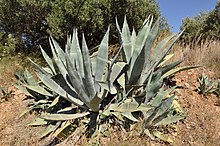| Agave | |
|---|---|

| |
| Agave americana | |
| Scientific classification | |
| Kingdom: | Plantae |
| Clade: | Tracheophytes |
| Clade: | Angiosperms |
| Clade: | Monocots |
| Order: | Asparagales |
| Family: | Asparagaceae |
| Subfamily: | Agavoideae |
| Genus: | Agave L.[1] |
| Type species | |
| Agave americana | |
| Species | |
|
See text. See also full listing. | |
| Synonyms[1] | |
| |
Agave (/əˈɡɑːvi/; also UK: /əˈɡeɪvi/;[3] Anglo-Hispanic, also US: /əˈɡɑːveɪ/)[4] is a genus of monocots native to the arid regions of the Americas. The genus is primarily known for its succulent and xerophytic species that typically form large rosettes of strong, fleshy leaves.[5]
Many plants in this genus may be considered perennial, because they require several to many years to mature and flower.[5][page needed][6] However, most Agave species are more accurately described as monocarpic rosettes or multiannuals, since each individual rosette flowers only once and then dies; a small number of Agave species are polycarpic.[5][page needed][6]
Along with plants from the closely related genera Yucca, Hesperoyucca, and Hesperaloe, various Agave species are popular ornamental plants in hot, dry climates, as they require very little supplemental water to survive.[6] Most Agave species grow very slowly.[5] Some Agave species are known by the common name "century plant".[7]
Maguey is a Spanish word that refers to all of the large-leafed plants in the Asparagaceae family,[citation needed] including agaves and yuccas. Maguey flowers are eaten in many indigenous culinary traditions of Mesoamerica.
- ^ a b Cite error: The named reference
POWO_325900-2was invoked but never defined (see the help page). - ^ Cite error: The named reference
IPNI_325900-2was invoked but never defined (see the help page). - ^ "agave noun". Oxford Learner's Dictionaries. Oxford University Press.
- ^ An Anglo-Hispanic pronunciation. Sunset Western Garden Book, 1995:606–607.
- ^ a b c d Cite error: The named reference
Gentrywas invoked but never defined (see the help page). - ^ a b c Cite error: The named reference
Irish-2000was invoked but never defined (see the help page). - ^ Cite error: The named reference
Baileywas invoked but never defined (see the help page).